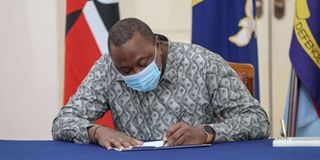High stakes for Mt Kenya region as Uhuru battles twin Jubilee revolt

President Uhuru Kenyatta signs into law the Tax Laws (Amendment) Bill 2020 and the Tea Bill of 2018 at State House, Nairobi. Uhuru has signed the Anti-Doping (Amendment) Bill, 2020 into law on December 31, 2020.
What you need to know:
- In the Mt Kenya region, the referendum agenda and the 2022 election politics are on a collision course.
- Prioritising constitutional reform over the 2022 election has effectively put the Kenyatta succession agenda in Mt Kenya in the deep freezer.
The Mt Kenya region is living through a uniquely rebellious moment in history. The smouldering rebellion signifies a crash of President Uhuru Kenyatta’s two political agendas, now casting a dark shroud over his legacy and the political future of his home turf.
The first agendum is the referendum, slated for June 2021 to review the 2010 Constitution through the Building Bridges Initiative (BBI), to accommodate the country’s 42-plus communities, entrench equity and national unity.
The second agendum is the need to carefully manage the political transition in the 2022 General Election to guarantee safety and continuity in the implementation of his legacy.
In the Mt Kenya region, the referendum agenda and the 2022 election politics are on a collision course. Prioritising constitutional reform over the 2022 election has effectively put the Kenyatta succession agenda in Mt Kenya in the deep freezer.
The double-barrelled question of who will succeed Kenyatta as the region’s kingpin and as Kenya’s 5th president is the proverbial bull in a China shop! It has deeply divided the local power elite, precipitated widespread uncertainty and radicalised Kenyatta’s support base. It has also turned BBI into a political hot potato and a lightning rod for an epic rebellion against the President.
Nearly 570 days to the 2022 election, Kenyatta faces two interlinked rebellions in Jubilee. The first was recently dramatised by the “Kang’ata dossier”.
Jubilee Party’s Senate Majority Whip, Mr Irungu Kang’ata, wrote a letter to Mr Kenyatta dated December 30, 2020, controversially painting a bleak picture of the referendum’s prospects.
Claiming that only two out of 10 people in the region supported the project, Kenyatta’s foot soldier warned his boss risked an embarrassing defeat.
Mr Kang’ata, who was recently fronted by his peers to spearhead the reform agenda in the region, took the now familiar path of populism and leaked the letter to the press.
Kangata’s populism may have been propelled by his gubernatorial ambitions in Murang’a and the inherently transactional and laissez faire style of the region’s leadership.
But it also reflected a realpolitik response to the fluidity of Mt Kenya politics and a genuine fear among elected leaders about their future in a post-Kenyatta nation. While Ruto and Raila are considered front-runners, Uhuru comes through as a kingmaker, owing to the region’s tyranny of numbers, expected to be decisive in the 2022 contest.
Fearing that being on the wrong side of the referendum may end their political careers, the vast majority of elected leaders in the region have been lying low or fence-sitting.
Two centres of power
As such, the region’s politics is dominated by a small but vociferous Tangatanga squad allied to Deputy President William Ruto.
Perhaps the game would have been easier if President Kenyatta had picked a regional heir as kingpin. But Jubilee bigwigs fret that this could create two centres of power. Without an outright kingpin and with Kenyatta exiting, ambitious politicians in the region have been jostling and elbowing each other for the number two slot in the nation.
The second front of the rebellion in Kenyatta’s Jubilee is the Kalenjin Rift Valley. The Rift Valley Revolt is coalescing around the the United Democratic Alliance (UDA), heir to the now moribund United Republican Party (URP).
Seemingly, Ruto has been determined to push Kenyatta to a lame-duck stage long before his presidency’s twilight days. After the 2018 handshake, he has leaned heavily on what Sir Lawrence Freedman describes in his book, Strategy: A History ( 2013) as “Satan’s Strategy”.
Stanley Baldwin once characterised this shade of rebellion as “power without responsibility: the prerogative of the harlot throughout the ages”.
Despite being the second-in-command, Ruto is the new face of Kenya’s unusual opposition! He seeks to maintain his control over Jubilee’s Kalenjin stronghold in the Rift Valley and to wrest the mantle of Mt Kenya leadership from Kenyatta ahead of the 2022 vote.
In the Rift Valley, the DP seeks to transform Jubilee’s Kalenjin constituency into what political scientist Carl Stone theorised in the 1980s as a Jamaican-style “garrison community” – a political culture where politicians and local gangs colluded to exercise control over local communities. Rival Kanu chief Gideon Moi is depicted as “traitor” (Bunyot).
The strategy seeks to “divide and conquer” the Gema – Gikuyu, Embu and Meru—community, effectively wresting it from the region’s critical minds and finally putting it under the thumb of the Kalenjin power elite in the post-Kenyatta era.
In Ruto’s wedge politics, Kenya is cast as locked in an apocalyptic class struggle between ‘the haves’ (‘dynasties’) and ‘the have-nots’ (‘hustlers’).
Undeniably, BBI’s triumph will put Raila ahead of the pack as Kenyatta’s de facto successor. Not surprisingly, critics in Mt Kenya equate BBI with Raila.
But Mt Kenya’s tyranny of numbers is unduly over-rated. As history has shown, the June 2021 referendum can be won without the Mt Kenya region. Although the region overwhelmingly voted for the “banana/yes” in the November 2005 Referendum, the proposed new constitution was rejected by 58 per cent of voters!
Nevertheless, the stakes are extremely high for the region. Kenyatta must emphatically win the plebiscite to clinch his national legacy and reassert his influence in the region. Victory for the referendum without the Mount Kenya vote will weaken the region’s power in national politics.
Professor Peter Kagwanja is a former Government Adviser and Chief Executive, Africa Policy Institute





